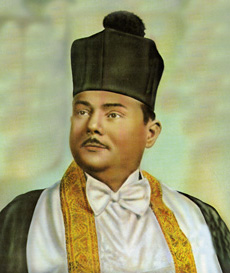JSA Highlights: Cantor Moshe Koussevitzky

The name of Cantor Moshe Koussevitzky can be placed alongside Cantor Yossele Rosenblatt, Cantor Gerson Sirota, and Cantor Zawel Kwartin — the most honored names from the Golden Age of Cantorial music. The JSA’s online selection of recordings by Cantor Moshe Koussevitzky contains 13 albums from the JSA’s Collectors Guild and Famous record label collections, a total of 100 separate song tracks.
Moshe Koussevitzky was born into a family of cantors and so his vocal gifts were not overlooked, even at an early age. Born in 1899 in Belarus, he was a teeneager when WW I began. The Koussevitzky family relocated to Russia where his cantorial studies continued. By 1925 he could be heard in the Great Synagogue of Vilna, Poland. And in 1928 Koussevitzky was awarded the position vacated by the renowned great Cantor Gerson Sirota at the Tlomacki Synagogue of Warsaw.
According to Benedict Stambler, founder of Collectors Guild records, it was in Warsaw that Koussevitzky’s “voice reached its full power and brilliance.” His popularity spread as he performed throughout Europe and Palestine in the 1930s.
Trapped in Poland during WWII Koussevitzky was rescued by members of the Polish underground and brought to Russia. There he was reunited with his family soon afterward. After the German retreat he became the principal tenor in the Tiflis National Opera Company in Georgia. The four Koussevitzky brothers were all exceptional cantors. Moshe, David, Jacob and Simcha reunited in London in 1946 to give a stirring farewell appearance at the Royal Albert Hall before an audience of thousands.
The JSA’s online collection of Koussevitzky recordings encompasses the full career of this great cantor, from his early recordings to his later works. Of special interest is his recording of Sheyiboneh Beys Hamikdosh which allows the cantor’s full range of talents to be heard.